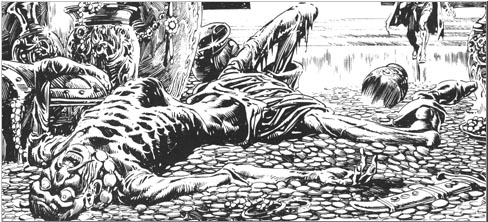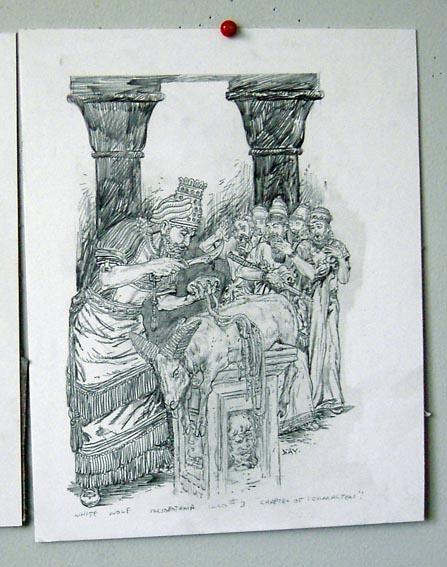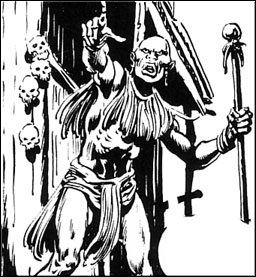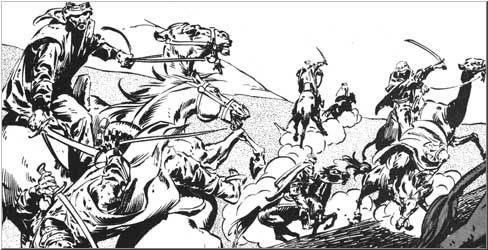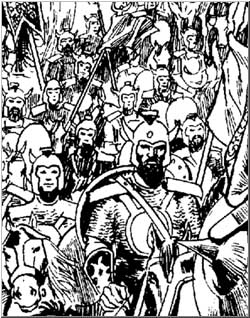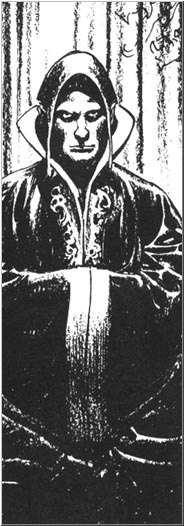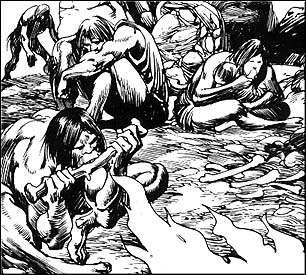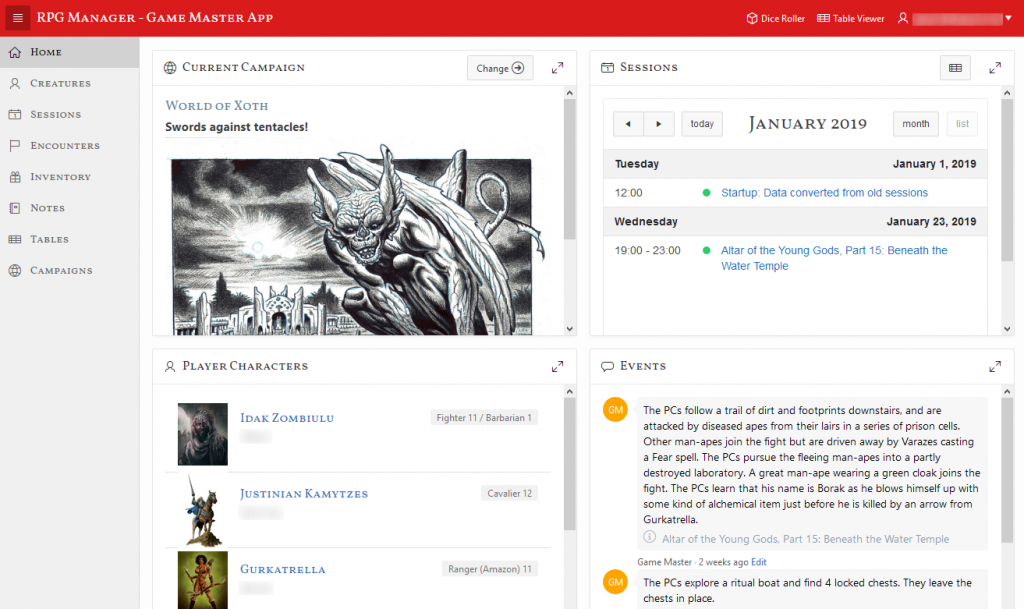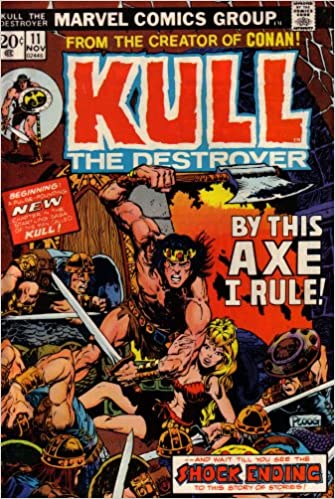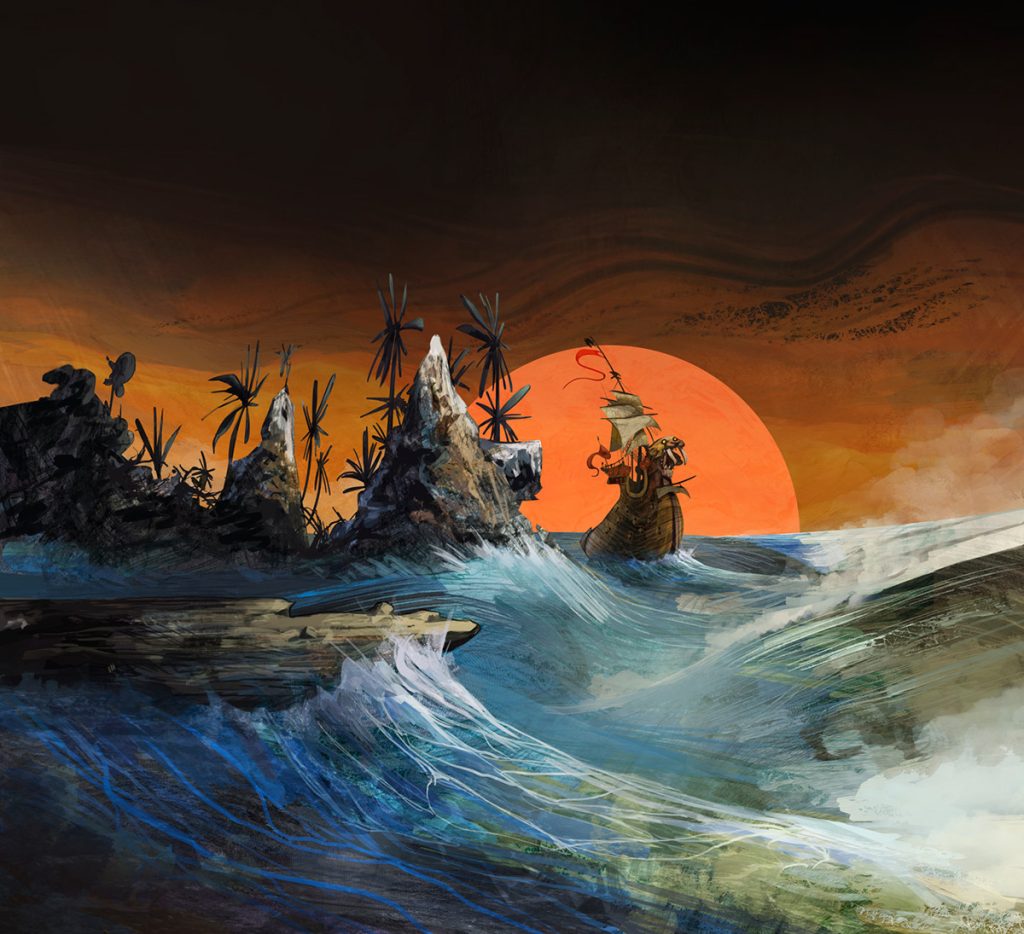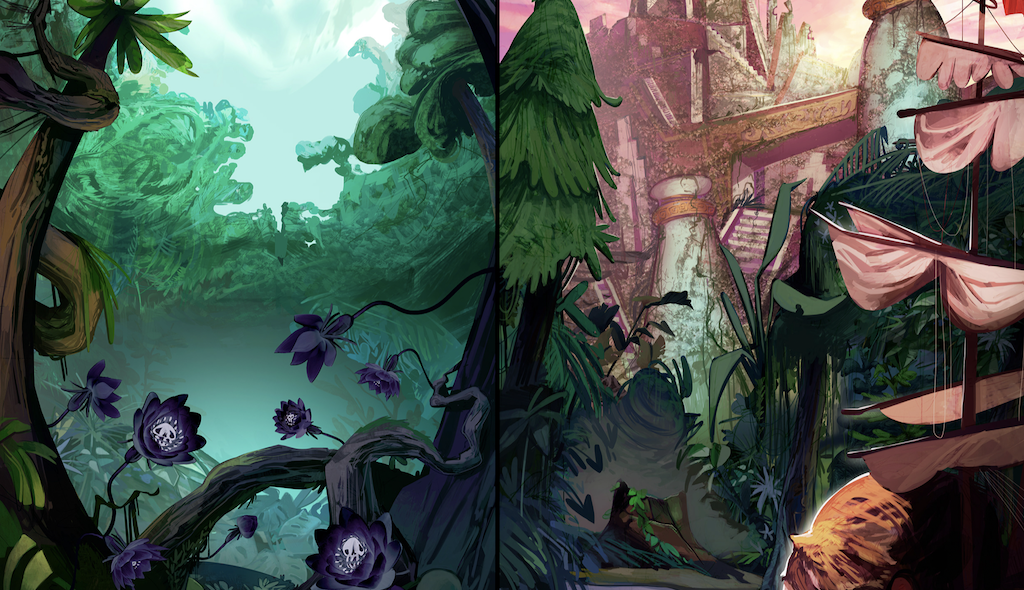“In the temple of the city of Morm, which lies between the desert and the sea, are two images of the god Amanon, a bronze image facing an iron image, across the fires and blood-stains of the alter-stone. When the gory sunset of the day of sacrifice is over and the writhing fires of the sacrifice are dead, and the moon smiles with a cold and marble smile on the blackened altar — then Amanon speaks to Amanon, with a voice of iron, and a voice of bronze…”
— Clark Ashton Smith: The Image of Bronze and the Image of Iron
Here follows a list of the religions and cults of the World of Xoth. Note that this post is called Cults of Xoth, not Gods of Xoth, for who can be certain that the gods really exist? The ecclesiastical members of a cult are called cultists.
Ahyada, the High God of Taraam
Ahyada is the bringer of truth and protection to the people of Taraam, and the patron of the royal house of Achad as well. He grants visions and omens to the king, which are interpreted by astrologer-priests and soothsayers. Amulets of Ahyada are said to be effective wards against demons.
Aklathu, the God of Twisted Fate
Figurines of this god, who has few temples and no priests, depict Akhlathu as a deformed dwarf, whose facial features even show a hint of retardation. Many Susrahnites swear “By Akhlathu’s Beard!” when in trouble. This is also a god of thieves and gamblers.
Al-Tawir, the Ancient One, the Sleeper Beneath the Sands
Some say that Al-Tawir dwells in the black gulfs between the stars, others that he sleeps in a sealed and forbidden tomb beneath the desert sand. Al-Tawir is one of the Old Gods. The nomads hear his voice in the howling of the desert winds, and they see his face in the rage of sandstorms. He is the emptyness of the desert, associated with getting lost, with thirst and hunger, with darkness, and with sandstorms.
Initiation Rite: Gouge out your own eyes, as a sign of respect to Al-Tawir, whose true form it is forbidden to behold.
Class Skills: A cultist of Al-Tawir adds Intimidate (Cha), Knowledge (Arcana) (Int) and Survival (Wis) to his list of class skills.
Cult Spells: Unseen Servant (1st), Whispering Wind (2nd), Deeper Darkness (3rd), Crushing Despair (4th), Nightmare (5th), Find the Path (6th), Control Weather (7th), Whirlwind (8th), Antipathy (9th)
Cult Secrets: Air Barrier, Wind Sight, Dweller in Darkness, Guiding Star, Interstellar Void, Lore Keeper, Nature’s Whispers, Lifesense
Baal-Khardah, the Sun-God of Susrah
The lord of the sky, protector and judge of humankind, Baal-Khardah is a distant god, usually worshipped only by nobility. The common people tend to favor the more earthly passions of his mate, Belet-Lil. His lavish temples are filled with ram-headed statues, golden sun-discs, and sacred swords.
Belet-Lil, the Moon-Goddess of Susrah
Voluptous mate of Baal-Khardah, and earth-mother, Belet-Lil is a goddess of fertility, revelry, and beauty. She is very popular among the Susrahnites, not least due to the large numbers of temple prostitutes found in every city.
Initiation Rite: Offer your virginity to a member or patron of the cult.
Class Skills: A cultist of Belet-Lil adds Acrobatics (Dex), Handle Animal (Cha) and Knowledge (Local) (Int) to his list of class skills.
Cult Spells: Charm Person (1st), Delay Poison (2nd), Neutralize Poison (3rd), Restoration (4th), Dominate Person (5th), Antilife Shell (6th), Heal (7th), Sympathy (8th), Dominate Monster (9th)
Cult Secrets: Combat Healer, Mantle of Moonlight, Moonlight Bridge, Delay Affliction, Enhanced Cures, Healing Hands, Life Link, Safe Curing, Spirit Boost
Ia-Azutlatl, the Blood-God of Sunken Ptahaana
The true form of Ia-Azutlatl is unknown, but he is one of the Old Gods; some even claim that he is the greatest and oldest of those ancient ones. It is known that the blood-druids of now-sunken Ptahaana worshipped him with ceremonies of mass slaughter atop their stepped pyramids of green stone. Today, his name survives only in the rituals of primitive savages and mad hierarchs.
Jul-Juggah, the Devil-Bird of Azimba
The sweltering plains of Azimba are dotted with hundreds of monstrous statues of lizard-birds. Whether these grim effigies were crafted by an older civilization, or placed there more recently by the feather-cloaked shamans of Jul-Juggah, is not known.
Initiation Rite: Fetch an egg from a devil-bird’s nest in the mountains of Azimba.
Class Skills: A cultist of Jul-Juggah adds Knowledge (Nature) (Int), Perception (Wis) and Ride (Dex) to his list of class skills.
Cult Spells: Feather Fall (1st), Scare (2nd), Rage (3rd), Stoneskin (4th), Song of Discord (5th), Stone Tell (6th), Wind Walk (7th), Earthquake (8th), Soul Bind (9th)
Cult Secrets: Battlecry, Surprising Charge, War Sight, Armor of Bones, Bleeding Wounds, Bonded Mount (pteranodon), Natural Divination, Rock Throwing
The Living Flame, Nameless God of Zadj
The Zadjites worship a nameless elemental god, the Living Flame, above all other gods. The priests tend everburning fires in their marble temples. Fire is considered pure; both the dead and the unbelievers are cast into the flames to be purified. Fire also imbues metal with a spark of the divine; the priests of the Living Flame are skilled metal-workers and weaponsmiths.
Initiation Rite: Purify your body and soul by immolating yourself in the sacred temple fires of Iraab.
Class Skills: A cultist of the Living Flame adds Intimidate (Cha), Perform (Cha) and Sleight of Hand (Dex) to his list of class skills.
Cult Spells: Produce Flame (1st), Burning Hands (2nd), Quench (3rd), Greater Magic Weapon (4th), Wall of Fire (5th), Contagious Flame* (6th), Fire storm (7th), Incendiary Cloud (8th), Mage’s Disjunction (9th)
Cult Secrets: Iron Skin, Weapon Mastery, Burning Magic, Cinder Dance, Fire Breath, Firestorm, Gaze of Flames, Molten Skin
Maggash, the Brazen God of Zhaol
Abominable are the brass idols of Maggash, the fire-god of Zhaol, and even worse are the rites of the priesthood, which include the burning of infants as sacrifice. The priests of Zhaol accept no other god than their own, and worship of other gods is strictly forbidden and punishable by death.
Maggash is sometimes depicted as a bull, or a bull-headed humanoid.
Nhakhramat, the Six-Armed Woman
The ivory woman, said by some to be the mate of Yadar, is worshipped largely by Khazistanis who disapprove of Belet-Lil’s open sensuality, which is a source of conflict between the Khazistanis and the Susrahnites.
Nwanga Zhaal, the Lord of Beasts
Known and feared across the Jungle Kingdoms, this bloodthirsty god is master of the beasts that howl at the moon. His shamans are always served by flocks of bonded animals.
Othabbhon, the Guardian of the Gates
Depicted as a horse-headed humanoid clutching a bronze key, this mysterious god is a protector of homes and vaults, as well as the guardian of secret and hidden places.
Simatala, the Ape-God of Laksha
Turbaned priests strangle sacrificial victims on the white jade altars of this grim ape-god of the east, whose cult has even begun to spread to the west.
Yaathra Yok, the Wise One
This is an elephant-headed god of the east, revered for its great strength and wisdom. Temples of the cult contain rich treasures of ivory.
Initiation Rite: Solve the Sacred Riddle before your head is crushed underfoot by an elephant.
Class Skills: A cultist of Yaathra Yok adds Appraise (Int), Knowledge (Dungeoneering) (Int) and Linguistics (Int) to his list of class skills.
Cult Spells: True Strike (1st), Calm Emotions (2nd), Explosive Runes (3rd), Locate Creature (4th), Telepathic Bond (5th), Legend Lore (6th), Vision (7th), Repel Metal or Stone (8th), Foresight (9th)
Cult Secrets: Iron Skin, Resiliency, Life Link, Lifesense, Arcane Archivist, Brain Drain, Focused Trance, Think On It
Yadar, the Lord of Death and Secrets
The mysterious high god of the Khazistanis, Yadar, is said to live in the desert and to collect the souls of every living man and woman when they give up their final breath.
Yadar is associated with scorpions and bats. Many carry charms and amulets in the image of Yadar, said to ward against disease and violent death.
Such worship is often personal and unorganized, since the locations of Yadar’s temples are generally kept secret and known only to the priests. The cult is suspected to have subterranean shrines in cities, and temples in desert ruins. The nomads stay well away from such ruins, since any who stray too close disappear without a trace.
Yammosh, the Sea-God of Ghazor
The greatest temple of this Susrahnite sea-god is located in the sinful port city of Ghazor, although sailors from many nations offer sacrifice to him before setting out on long ocean voyages.
Initiation Rite: Survive ritual drowning.
Class Skills: A cultist of Yammosh adds Escape Artist (Dex), Knowledge (Geography) (Int) and Swim (Str) to his list of class skills.
Cult Spells: Touch of the Sea* (1st), Fog Cloud (2nd), Water Breathing (3rd), Black Tentacles (4th), Suffocation* (5th), Control Water (6th), Control Weather (7th), Seamantle* (8th), World Wave* (9th)
Cult Secrets: Guiding Star, Star Chart, Lore Keeper, Friend to the Animals (aquatic creatures only), Speak with Animals (aquatic creatures only), Fluid Nature, Water Sight, Thunderburst
Yibboth, the Sacred Toad of Fakhuum
Despite having its cult-centre deep within the poisoned marshes of Fakhuum, whether Yibboth is part of the true Yar-Ammonite pantheon is uncertain; some claim he is one of the Old Gods. The priests of Yibboth are reputed to worship a golden “frog-thing”, along with mummified crocodiles and all manner of water lizards and giant toads.
Yot-Kamoth, the Spider-God of Lamu
The Lamurans bow before black idols of Yot-Kamoth, the monstrous eight-legged god worshipped for centuries in the mountain fastness of Lamra, the capital city. In truth, the priests of the spider-god are the royalty of Lamu, for they wield considerable influence and for a common man to resist their demands is a certain death sentence.
Zanthiss, the Great Serpent
The ancient demon-serpent of Yalotha, in some worlds known as Hassith-Kaa, is the father of various ophidian races and a master of sorcery. Zanthiss is currently believed to be confined to an extradimensional prison, or perhaps banished to a remote star, after the downfall of the serpent-empire of Yalotha.
However, cults of Zanthiss still lair in ancient temples, with pits filled with writhing serpents, giant slithering temple snakes, malachite altars stained with the blood of centuries of sacrifice, and demon-guarded vaults wherein lie hidden the lost papyri of jungle-lost Yalotha.
The Gods of Tharag Thule
Among the gods worshipped in the cold wastes of the north are the Moon-God, the Wolf-God, and the Skull-God.
The Moon-God is served only by female priestesses; old hags and crones are respected omen-readers and oracles among the Tharagians.
The Wolf-God is a god of strength, war, and bloodlust. Tribal chieftains are often also priests of the Wolf-God.
The Skull-God is the lord of the dead and the king of ghosts; this god has no priests or followers, but each village has a hut set up with a skull-adorned altar where he is placated with offerings.
The Beast-Gods of Yar-Ammon
The Yar-Ammonites worship an ancient pantheon of beast-headed man-gods, disturbing fragments of a lost age. These gods, said to have brought knowledge and wisdom to the first civilization of Yar-Ammon, are usually depicted as humanoids with the heads of hyenas, rams, goats, vultures, and other animals. The priests of Yar-Ammon often wear masks in imitation of their gods.
